YouTube has enabled Scottish sheep farmer Cammy Wilson to increase his flock from four Texel hoggets in 2015 to lambing 850 ewes next spring on 1,000ac of rented land.
Wilson's 'The Sheep Game' channel on YouTube has over 42,000 followers and has had over 4.5m video views to date.
Irish fans make up 11% of the channel’s following (4,600) and, on average, 70,000 video views a week.
The videos track Wilson and his partner Lizzy’s journey through the trials and tribulations of sheep farming, scanning and shearing in Ayshire, Scotland, along with their newborn son Jock.
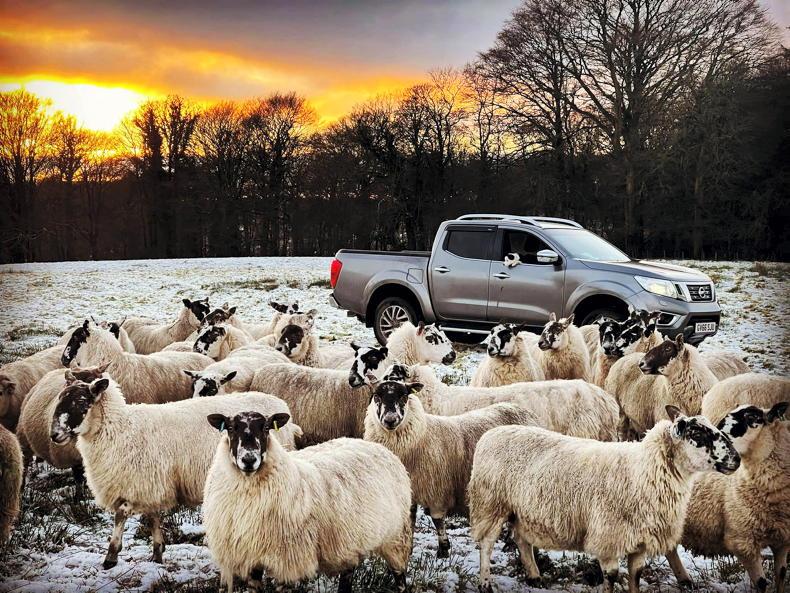
Wilson says he is a big fan of the Scotch Mule for its hardiness, milk and mothering ability.
Content can be both educational and entertaining, with weekly uploads focusing on sheep management, animal health, breeding and sales.
Starting out
Wilson is renting 1,000ac in several lots through what he described as “seasonal rents”.
“How did that even happen?,” the former Glasgow police officer asked himself during an interview with the Irish Farmers Journal.
Wilson described a “five-year lead-in” which started in 2015 after the death of his father who had been a shepherd.
Reflecting on the work of his father and the fact that he “really enjoyed working with sheep”, he “went to the market and bought four market ewe hogs”.
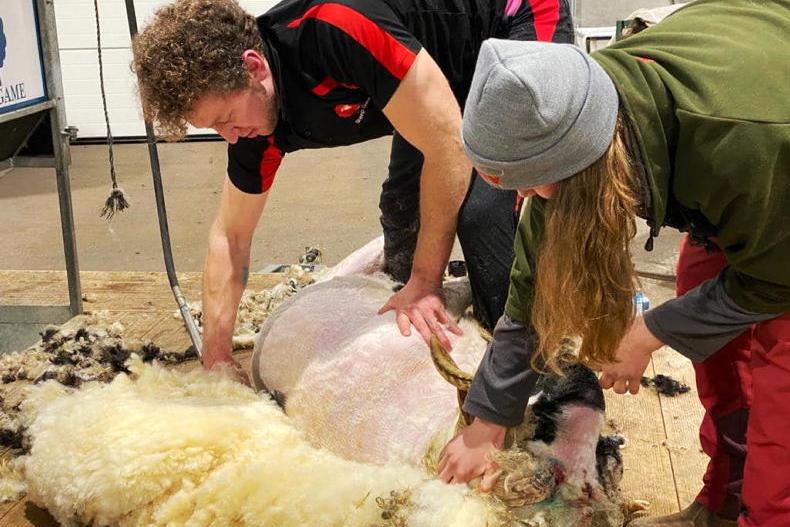
Cammy is also a contract sheep shearer and brings his YouTube followers on shearing trips across the Scottish isles.
He found himself a local shed to rent and said, since then, it has really “picked up from there”.
“I get so many farmers and young people messaging asking how can they get started out. It’s all about working hard and networking with farmers.”
The current 1,000ac is “wildly split up”, but predominantly found through renting with older and retired farmers.
Flock
Wilson is running 1,500 sheep at present, with 500 store lambs, which he is “excited to have left to sell” due to the strength of current prices.

Other videos on the channel demonstrate sheep auctions from across Scotland.
The 850 ewes he will lamb next spring are made up of Scotch Mules, North Country Cheviots and “Blackies”, which he keeps to breed replacement ewe lambs. He and Lizzy also run a small flock of Shetland sheep on rougher grazing.
“I’m a big fan of the Scotch Mules. We get quite attached to our breeds in this country.”
Breeding
Most rams are Texel, with Wilson explaining the “main focus is to rear a prime lamb nearly 100% off grass”.
The North Country Cheviots are run to Bluefaced Leicester rams to breed the Cheviot Mule, which the Scottish farmer said he likes, but is “still unsure of”.
Lambing starts in March and is a mix of indoor and outdoor. Wilson has recently secured another shed to rent for the lambing period and plans to lamb 400 to 450 of the Mules indoors.
He said he “probably will try take on an experienced lamber” this year and described lambing such high numbers across a number of locations as a “big team effort”.
“Your head is the most import thing in lambing.”
YouTube
Wilson initially started out documenting the challenges of sheep farming in Scotland through SnapChat.
He described “social media as a whole” as being negative and fake at times and said he wanted to show the real ups and downs of farming life.
“It’s a great way of showing some of the realistic negatives and showing other farmers that we’re all in this together.”

Cammy includes the farming and shearing community in his videos.
After success on SnapChat, some followers suggested he pick up YouTube.
“I think I have a good variety of content on the channel.
“Everyone wants to see other people’s practices for farming, shearing and pregnancy scanning.”
Wilson said he is totally self-taught when it comes to videoing and editing his content, but did get support from others in the business.
He described the significant time commitment involved, where “it can take eight to 10 hours to edit a 15-minute video”.
Income diversification
Wilson said YouTube “makes me money” and “it’s fun to share my story”.
He described how each video is auctioned for adds and the sponsorship he gets from a number of agri companies. He also sells branded merchandise to followers from around the world.
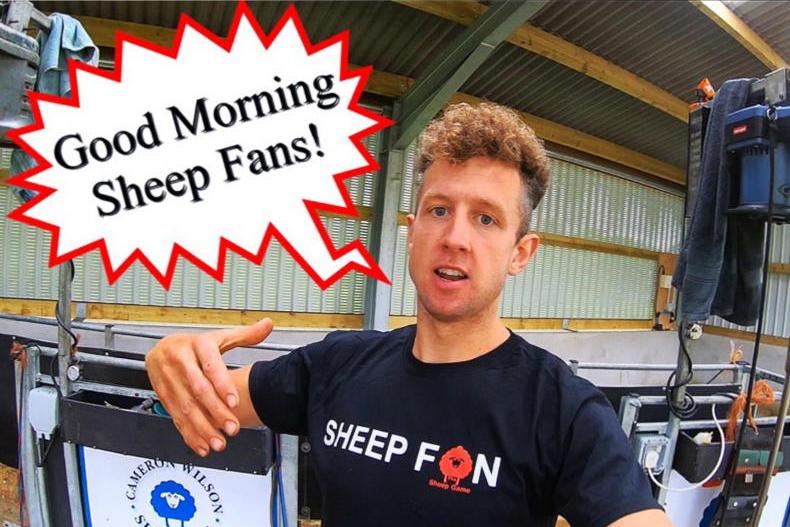
Editing a 15-minute video can take eight to 10 hours and Cammy says this time commitment is one of the most difficult aspects of YouTubing.
He said if The Sheep Game channel continues in this way, he and Lizzy hope to be able to use the money it makes to buy their own farm in five years’ time.
The new income also enabled Wilson to give up his job as a police officer in Glasgow in October.
“YouTube was the reason I was able to stop. It’s our farm income diversification.”
He said starting such a project is very difficult, but “you just have to keep trying”.
Irish farmers, who Wilson described as some of his most engaging, can follow The Sheep Game on YouTube.
YouTube has enabled Scottish sheep farmer Cammy Wilson to increase his flock from four Texel hoggets in 2015 to lambing 850 ewes next spring on 1,000ac of rented land.
Wilson's 'The Sheep Game' channel on YouTube has over 42,000 followers and has had over 4.5m video views to date.
Irish fans make up 11% of the channel’s following (4,600) and, on average, 70,000 video views a week.
The videos track Wilson and his partner Lizzy’s journey through the trials and tribulations of sheep farming, scanning and shearing in Ayshire, Scotland, along with their newborn son Jock.

Wilson says he is a big fan of the Scotch Mule for its hardiness, milk and mothering ability.
Content can be both educational and entertaining, with weekly uploads focusing on sheep management, animal health, breeding and sales.
Starting out
Wilson is renting 1,000ac in several lots through what he described as “seasonal rents”.
“How did that even happen?,” the former Glasgow police officer asked himself during an interview with the Irish Farmers Journal.
Wilson described a “five-year lead-in” which started in 2015 after the death of his father who had been a shepherd.
Reflecting on the work of his father and the fact that he “really enjoyed working with sheep”, he “went to the market and bought four market ewe hogs”.

Cammy is also a contract sheep shearer and brings his YouTube followers on shearing trips across the Scottish isles.
He found himself a local shed to rent and said, since then, it has really “picked up from there”.
“I get so many farmers and young people messaging asking how can they get started out. It’s all about working hard and networking with farmers.”
The current 1,000ac is “wildly split up”, but predominantly found through renting with older and retired farmers.
Flock
Wilson is running 1,500 sheep at present, with 500 store lambs, which he is “excited to have left to sell” due to the strength of current prices.

Other videos on the channel demonstrate sheep auctions from across Scotland.
The 850 ewes he will lamb next spring are made up of Scotch Mules, North Country Cheviots and “Blackies”, which he keeps to breed replacement ewe lambs. He and Lizzy also run a small flock of Shetland sheep on rougher grazing.
“I’m a big fan of the Scotch Mules. We get quite attached to our breeds in this country.”
Breeding
Most rams are Texel, with Wilson explaining the “main focus is to rear a prime lamb nearly 100% off grass”.
The North Country Cheviots are run to Bluefaced Leicester rams to breed the Cheviot Mule, which the Scottish farmer said he likes, but is “still unsure of”.
Lambing starts in March and is a mix of indoor and outdoor. Wilson has recently secured another shed to rent for the lambing period and plans to lamb 400 to 450 of the Mules indoors.
He said he “probably will try take on an experienced lamber” this year and described lambing such high numbers across a number of locations as a “big team effort”.
“Your head is the most import thing in lambing.”
YouTube
Wilson initially started out documenting the challenges of sheep farming in Scotland through SnapChat.
He described “social media as a whole” as being negative and fake at times and said he wanted to show the real ups and downs of farming life.
“It’s a great way of showing some of the realistic negatives and showing other farmers that we’re all in this together.”

Cammy includes the farming and shearing community in his videos.
After success on SnapChat, some followers suggested he pick up YouTube.
“I think I have a good variety of content on the channel.
“Everyone wants to see other people’s practices for farming, shearing and pregnancy scanning.”
Wilson said he is totally self-taught when it comes to videoing and editing his content, but did get support from others in the business.
He described the significant time commitment involved, where “it can take eight to 10 hours to edit a 15-minute video”.
Income diversification
Wilson said YouTube “makes me money” and “it’s fun to share my story”.
He described how each video is auctioned for adds and the sponsorship he gets from a number of agri companies. He also sells branded merchandise to followers from around the world.

Editing a 15-minute video can take eight to 10 hours and Cammy says this time commitment is one of the most difficult aspects of YouTubing.
He said if The Sheep Game channel continues in this way, he and Lizzy hope to be able to use the money it makes to buy their own farm in five years’ time.
The new income also enabled Wilson to give up his job as a police officer in Glasgow in October.
“YouTube was the reason I was able to stop. It’s our farm income diversification.”
He said starting such a project is very difficult, but “you just have to keep trying”.
Irish farmers, who Wilson described as some of his most engaging, can follow The Sheep Game on YouTube.









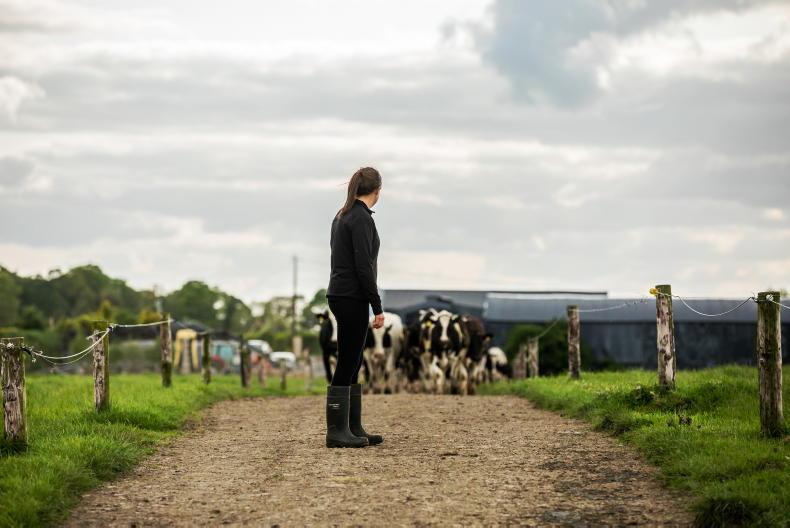

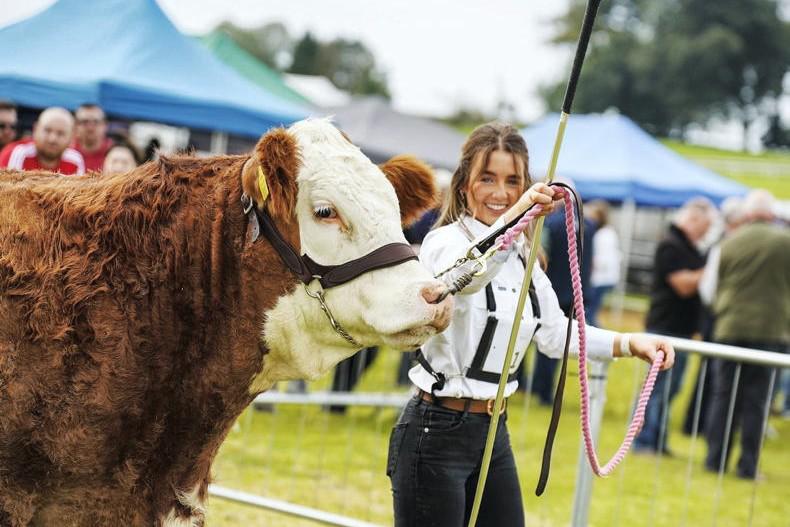

SHARING OPTIONS